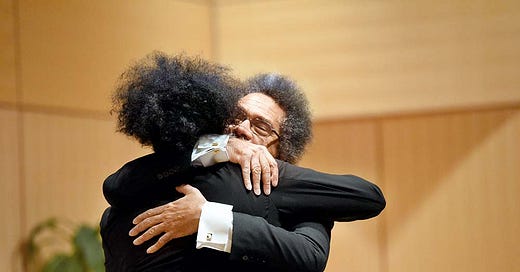Welcome to the Faith and Politics Project!
This February, we’ve been reflecting on all this month has brought, on Black history, on love, and, with heavy hearts, on the Russian invasion of Ukraine. As disparate as these topics seem, each of them comes us to reflect on how we relate to each other. Below, you’ll find Claire’s reflection on Ukraine, Hannah’s profile of Cornell West and radical love, news from this month, and more. We wish everyone a safe and love filled end of the month!
A Reflection on Ukraine
I could write about Valentine’s Day last week and the relationship between consumerist holidays and religion, but I’m a little distracted by the collective global anxiety brought upon by Russia’s invasion of Ukraine. I am an American who is lucky to have not experienced war directly and a Christian whose family once lived in Ternopil, Ukraine as missionaries in 1996. Recent events are both distant and intimate, though ultimately I carry an immense privilege in being here in Cambridge and not there.
Amidst the uncertainty that peace will prevail and human life will be saved from harm, I find I have nothing I can do except to turn to prayer, a practice that is often construed as religious. In a recent On Being episode, Pádraig Ó Tuama described prayer in a way I hadn’t expected. They describe prayer as a “container for the things that can be difficult to contain,” a practice in which we dignify our deepest desires and articulate a devotion in our own way. Ó Tuama calls all of us to prayer; to expand our limited imagination of prayer as a solely religious practice and rather as one that collects the “deep groans of our experience” and creates room for us to listen.
Let us ask for safety and peace, wisdom and resolution, in unison.
-Claire
In the News: Race, Religion, and Politics
Hijacking History: Why What We Teach Matters by Eric C. Miller interviewing Kathleen Wellman for Religion & Politics
“Remember that the evangelical alliance with the Republican Party has been shaped by racist dog whistles dating back to Richard Nixon and his Southern strategy. The recent panic stoked over critical race theory should be understood against that backdrop. Certain right-wing organizations and candidates have worked to gin up the fears of white parents, apparently, that a candid presentation of American history will harm their children’s feelings.”
How Black Spirituality has Shaped the Black Radical Tradition by Dhivya Sridar for Sojourners
“Oluwatomisin Oredein, director of the Black Church Studies program at Brite Divinity School, told Sojourners that the relationship between the Black church and radical tradition expands beyond institutions of individual churches. Black people have used Christian messages and scripture to resist white enslavers, a tradition carried on in Black radicalism.”
How 18th-century Quakers led a boycott of sugar to protest against slavery by Julie L. Holcomb for The Conversation
“Until his death in 1772, Woolman worked within the structure of the Society of Friends, urging Quakers to abstain from slave-grown sugar and other slave-labor products. In his writings, Woolman envisioned a just and simple economy that benefited everyone, freeing men and women to “walk in that pure light in which all their works are wrought in God.” If Quakers allowed their spiritual beliefs to guide their economic habits, Woolman believed, the “true harmony of life” could be restored to all.”
Religious Profile: Cornel West and Radical Love
In the legacy and tradition of radical love, Dr. Cornel West shines exceedingly bright. A world renowned speaker and decorated academic, West was raised in Sacramento within the Black Baptist tradition. Often when prefacing a lecture or interview, Dr. West situates himself within the legacy in which he was raised; this legacy includes both the immediate legacy of his father Rev. Clifton West and his late mother Irene West, as well as the broader legacy of activists such as Fannie Lou Hamer and Martin Luther King Jr. This gesture toward genealogy reflects more than humility, but a recognition of our interconnectedness and the collaborative nature of the pursuit of justice.
When speaking on race, oppression, and societal grievances, West is not hesitant to invoke his religious convictions. He frequently cites Biblical metaphors and speaks candidly on how the Christian tradition actively shapes his worldview. One of the most commonly referenced theologies is that of radical love.
Radical love may be universal love, but it is not blind or naïve love. On the contrary, “radical love [demands] a radical analysis of power, domination, and oppression.” It requires one to reject the cycles of dehumanization by choosing to love those who hurt you. Radical love is a practice, according to West, that “takes unbelievable spiritual courage, [and] moral fortitude.”
As February—both Black History month and the month of love—comes to a close, let us consider what is perhaps West’s most famous reflection on this topic:
“Justice is what love looks like in public.”
Jobs
Executive Director - Jewish Youth for Community Action
Organizing Director - Ohio Organizing Collaborative
Director of Programs - Federation of Protestant Welfare Agencies
Communications Associate - Jewish Council on Urban Affairs
Donor Engagement Associate - Muslim Engagement USA
Racial Justice Organizer - Essex County Community Organization (ECCO)
Advocacy Assistant - Catholic Relief Services




